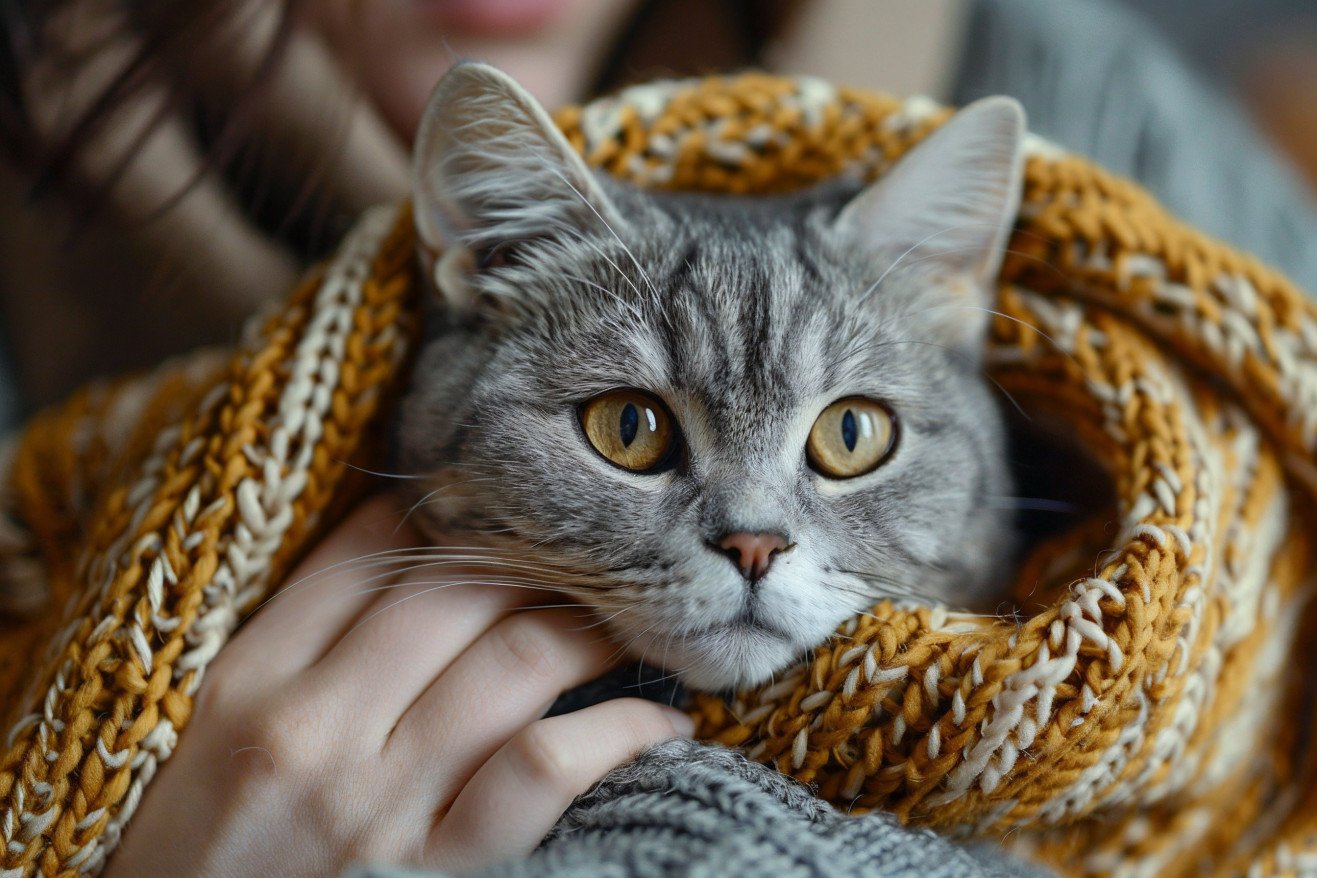Why Is My Cat Shaking? Understanding Feline Tremors and Health
3 March 2024 • Updated 1 March 2024

If you’ve noticed that your cat is shaking, you may be wondering what’s going on. There are a number of reasons why your cat may be shaking, including fear, anxiety, hypoglycemia, pain, and cold, as well as medical issues such as kidney disease and toxicity.
If your cat is shaking and it doesn’t stop or if it’s accompanied by other symptoms, it’s important to see a vet right away to rule out any medical problems.
This article includes information from reputable sources such as research papers, scientific journals, and insights from veterinarians, as well as data from the American Society for the Prevention of Cruelty to Animals (ASPCA), the American Veterinary Medical Association (AVMA), and the American Animal Hospital Association (AAHA).
This article provides a thorough review of the medical and environmental causes of shaking in cats, explaining when it’s nothing to worry about and when it could be a sign of a more serious issue, so you can make sure you’re doing everything you can to keep your cat healthy.
Why is my cat shaking?
How to Tell If Your Cat’s Shaking Is Normal or Cause for Concern
While shaking can be a normal behavior in cats, it’s important for pet parents to be able to tell the difference between normal shaking and shaking that could be a sign of an underlying issue. Cats may shake when they’re in a deep sleep, which may indicate that they’re dreaming, or when they’re playing and get overstimulated.
In these cases, the shaking is likely to be short-lived and not a cause for concern. BetterPet notes that it’s normal for cats to shiver occasionally, especially if they’re kittens, since they’re more sensitive to the cold.
On the other hand, if your cat is shaking all the time or if the shaking is accompanied by other symptoms, such as lethargy, a lack of appetite, or aggression, it may be a sign of a more serious issue.
The cat’s history and environment can also be important factors. For example, shaking may be a sign of anxiety after a recent move, as PetMD explains in its article on cat anxiety.
That said, if your cat is shaking and has a fever or seems to be in pain, as VCA Hospitals explains, it’s time to call the vet to rule out an infection or another medical issue.
As always, it’s important to pay attention to your cat’s behavior and to err on the side of caution. If your cat is shaking all the time and you can’t figure out why or if the shaking is accompanied by other signs of distress, it’s time to make an appointment with your vet.
Catching and treating any issues early is the best way to help your cat overcome any health issues that may be causing them to shake.
Understanding the Medical Causes of Your Cat’s Tremors
Tremors can be a sign of several medical conditions, including hypoglycemia, kidney disease, and exposure to toxins. Hypoglycemia, which is when blood sugar levels fall too low, can lead to weakness, lethargy, and even seizures. According to PetMD, hypoglycemia can be a dangerous complication of diabetes in cats and must be treated immediately to avoid further complications.
Meanwhile, BetterVet notes that kidney disease can lead to symptoms like shaking, weight loss, increased thirst, and vomiting and is most common in older cats or cats that have been exposed to toxins.
Veterinarians will diagnose these conditions with a thorough physical exam and blood work, urinalysis, and sometimes imaging like X-rays or ultrasounds. Treatment will depend on the condition and may involve stabilizing blood sugar levels immediately, as recommended by WagWalking, and then managing the condition with dietary changes and medications in the long term.
It’s important to catch these conditions early and seek medical attention quickly. Doing so can help reduce pain and prevent more serious conditions from developing. With the right care and regular vet visits, many cats can live happy, comfortable lives despite these conditions.
Stress-Related Shaking in Cats
Environmental and emotional stressors are often the most common causes of non-medical shaking in cats. Changes in their environment or routine can be stressful for cats and cause them to physically react with shaking. Small Door Veterinary explains that anxiety can lead to extreme emotional stress in cats, which can result in medical issues such as shaking. Cats with anxiety often react to environmental stressors by overgrooming, hiding, pacing, and shaking.
Purina explains that signs of anxiety in cats can also include following their owners around the house and destructive behavior when they are left alone, which are signs that a cat is having a hard time coping.
It’s important to make sure that you’re creating a stress-free environment to help prevent stress-related shaking. Small Door Veterinary suggests creating safe spaces and using natural remedies like pheromone sprays to help calm anxious cats.
Banfield Pet Hospital suggests that pet parents make changes in their cat’s environment slowly and engage in play to help cats feel safe and secure. In addition, experts suggest using pheromone diffusers, like Feliway, as a non-pharmacological intervention that can help create a more calming environment by releasing pheromones that mimic the scent of a cat’s facial pheromones.
Just like with physical health issues, it’s important to make sure that you’re addressing your cat’s emotional well-being. By creating a stable and stress-free environment, you can help reduce the stress that can lead to shaking, which will help ensure that your cat is healthy and happy.
Infectious Diseases and Neurological Conditions That Cause Tremors in Cats
In addition to the above causes, if your cat is experiencing tremors, infectious diseases and neurological conditions are other possibilities to consider. The Merck Veterinary Manual explains that a mutation of the feline coronavirus leads to Feline Infectious Peritonitis, a serious disease that has severe and often fatal outcomes. Clinical signs of FIP can include fever, jaundice, abdominal effusion, and neurological signs like ataxia and seizures.
Feline panleukopenia, which is another serious concern noted by the American Veterinary Medical Association, affects cells that divide rapidly, which leads to clinical signs like diarrhea, vomiting, and severe depression. Kittens that are infected can develop encephalopathy, which can lead to tremors or ataxia. Both FIP and panleukopenia require a thorough clinical exam and specific tests to diagnose. Treatment is mostly supportive, as there is no cure for FIP, and panleukopenia is treated symptomatically.
The Journal of Feline Medicine and Surgery explains that diagnosing neurological diseases in cats, including non-FIP encephalitides, is difficult because of non-specific clinical signs and limited diagnostic testing. Vaccines are especially important in preventing these diseases, especially panleukopenia. Neurological disorders require early detection and specialized care. Therefore, it’s important to make sure you’re taking your cat to the vet for regular check-ups and keeping an eye out for any signs of distress.
What to Do if Your Cat is Shaking: Next Steps for Cat Owners
If you see your cat shaking, take a moment to assess the situation. If the shaking is mild and your cat is otherwise acting normally, you may be able to care for your pet at home. Make sure your cat has a warm blanket and a quiet place to rest, and make sure they feel safe and secure.
If your cat is shaking due to stress or anxiety, PetMD recommends creating a calm environment and using products like pheromone diffusers to help your cat relax.
On the other hand, if your cat’s shaking is severe, persistent, or if it’s accompanied by other symptoms like a loss of appetite or a lack of energy, it’s important to seek help from a veterinarian right away.
According to Hill’s Pet, if you notice any changes in your cat’s behavior, grooming, or vocalization in addition to shaking, it’s time to take your pet to the vet. Cats.com also recommends rubbing honey on your cat’s gums if they’re shaking and cold and you suspect hypoglycemia, and taking your cat to the vet if their symptoms don’t improve.
Many causes of shaking can be avoided by making sure your cat gets regular check-ups. You can also help your vet diagnose the cause of your cat’s shaking by keeping a log of your cat’s shaking episodes, including the date and time of each episode, how long it lasted, and any potential triggers.
You can also help your cat avoid stress-related shaking by making sure they have a calm and predictable environment, which can help your cat feel more secure and reduce their stress.
As you can see, shaking can be a sign of a minor issue, but it can also be a sign of a more serious problem. Be sure to stay in tune with your cat’s needs and behaviors so you can help your pet stay healthy and happy.
The Takeaway: What to Know About Cat Shaking
As we’ve discussed in this article, there are many reasons why a cat might be shaking, and some of them are more serious than others. Medical issues like hypoglycemia, kidney disease, toxicity, infectious diseases, and neurological problems can all lead to tremors, so it’s important to be aware of these and to seek veterinary help if you notice your cat shaking because of these issues.
On the other hand, environmental and emotional issues like moving, new pets, or anxiety can also lead to shaking.
It’s important for cat owners to know the difference between normal and abnormal shaking. While shaking during sleep or play is usually nothing to worry about, shaking that comes with other symptoms is a cause for concern. In these cases, it’s important to make sure that you take your cat to the vet, as early treatment can help ensure that your cat gets the best treatment and has the best chance of recovery.
Creating a calm and stable environment can help reduce shaking that’s caused by stress and can help improve your cat’s overall well-being. Knowing what’s normal for your cat can help you make sure that you’re taking the best care of them. By paying attention to your cat’s behavior, you can make sure that you’re providing them with the best care and support.


